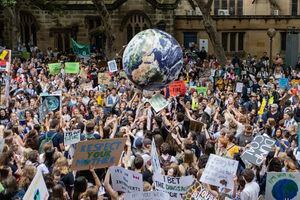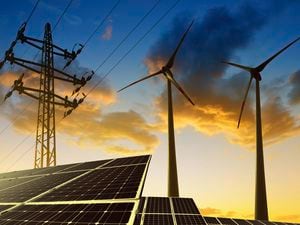A convenient emergency
SOMETIMES what we accept for the truth may not be the complete story. I feel this is the case with the current climate change debate and the local call for a declaration of a climate change crisis or emergency.

The language being used by climate change activists has of late become scarier with the specific intent to create fear and panic. I’ve heard it said that such is the current crisis or emergency, that we need to bring a Second World War response to stop climate change. Let’s remember that some 80m. people were killed in the Second World War, equating to 3% of the world population, many more millions were maimed, and vast areas of the world were devastated by bombing and open hostilities. This reality check puts into context the fear-mongering narrative being adopted, that in fact does no credit to the cause. A high-profile example is the speech by Greta Thunberg, the teenage activist who has dialled up the volume of the urgency debate with her well-publicised ‘house is on fire’ speech where she said ‘...I don’t want you to be hopeful. I want you to panic. I want you to feel fear… I want you to act as you would in a crisis. I want you to act as if your house is on fire. Because it is.’
Before going on, I want to make it clear that I absolutely believe in climate change. However, the current debate is occurring as if the earth’s climate has miraculously started to change for the first time.
The history of the earth is a compendium of climate change events of dramatic proportions. Evidence shows that there have been progressive periods of global cooling and ice ages followed by episodes of global warming when the climate was even warmer than present day, dating back to the dinosaur and before the industrial revolution. There have been periods when ice covered much of what is now Britain and other times, such as the present day, when Britain has been free of ice. Climate change alarmists want to ignore the complete story.
I accept that humans add carbon dioxide to the atmosphere and that carbon dioxide and other greenhouse gases have a warming effect on the planet. However, there is ongoing debate and conjecture on whether the recent warming has been caused predominately by the impact of human activity on CO2 emissions.
I’ve had many debates and discussions on climate change over recent years and am no longer surprised to find that regardless of the background or eminence of the climate change proponent, they have no idea what percentage of the atmosphere is made up of CO2. When pressed, most guess that it is around 20-30%. That’s what you’d expect given the premise that the world’s climate is generally stable, and that CO2 is the primary climate control knob. The argument goes that by reducing human-caused CO2, we can stop climate change, hence the current fanaticism with reducing CO2 emissions at any cost. The reality is that only 0.04% of the atmosphere is CO2. That’s right, 0.04%. The atmosphere contains some 78% nitrogen, 21% oxygen and the remaining 1% is made up of various small amounts of other gases of which C02 is 0.04%.
While this is a staggering enough piece of knowledge, what’s even more staggering is the fact that just 3% of the 0.04% of CO2 in the atmosphere is caused by global human activity. Given the level of focus on reducing CO2 emissions, you’d expect this percentage to be significantly higher.
By way of international comparison, Australia’s contribution to global human CO2 emissions is 1% of 3% of 0.04% whilst the US contributes some 15% of 3% of 0.04%. Given this, it’s hard to imagine what microscopic impact Guernsey’s human activity induced CO2 emissions are having on global climate.
Despite these minuscule numbers, reducing CO2 emissions has become the new religion. According to climate change activists, we must declare a climate emergency of Second World War proportions to ensure that every decision of government is made through the filter of climate change. Declaring a climate emergency sounds very much like Brexit – simple in theory but what does it mean in practice? What specific policies are envisaged, what resources are needed and what will it cost now and into the future?
I can give a small insight into what such decisions can cost. Australia has gone down the path of closing coal-fired power stations in favour of solar- and wind-generated energy. The result has seen Australia move from having the cheapest energy prices in the world to some of the most expensive. This has permeated every aspect of Australian life across industry and domestic households, such that for the first time in recent history, the disposable income of households is dropping at such a rate that families, the poor and vulnerable are finding heating or cooling of their homes increasingly unaffordable.
So what should a small island like Guernsey do?
Most importantly, it should ‘stay calm and carry on’ and not get sucked into the madhouse effect of declaring a climate emergency just for the sake of it, which consequently will require urgent, possibly ill-thought-through policies and action that will come at a significant cost to the economy and residents.
Instead, the island should adopt a pragmatic approach to climate change based on systematic analysis, incremental action and careful evaluation. Certainly, in the upcoming review of its energy policy, look for the most clean and green energy source that is affordable that doesn’t wreck the economy, foster and support research into energy innovation possibly through a local university presence and speciality, build resilience to extreme weather and promote practical pollution reduction programs such as eliminating plastics from the ocean, promote recycling and aim for a circular economy.
The focus of Guernsey should be on sustainability into the long term rather than decarbonisation as an all-consuming, blinkered goal at any cost.
In this regard, given Guernsey’s size, it could realistically become the global leader in electrification of vehicles and a global role model for climate change pragmatism in a world that appears to be going mad with climate change fear and panic.





